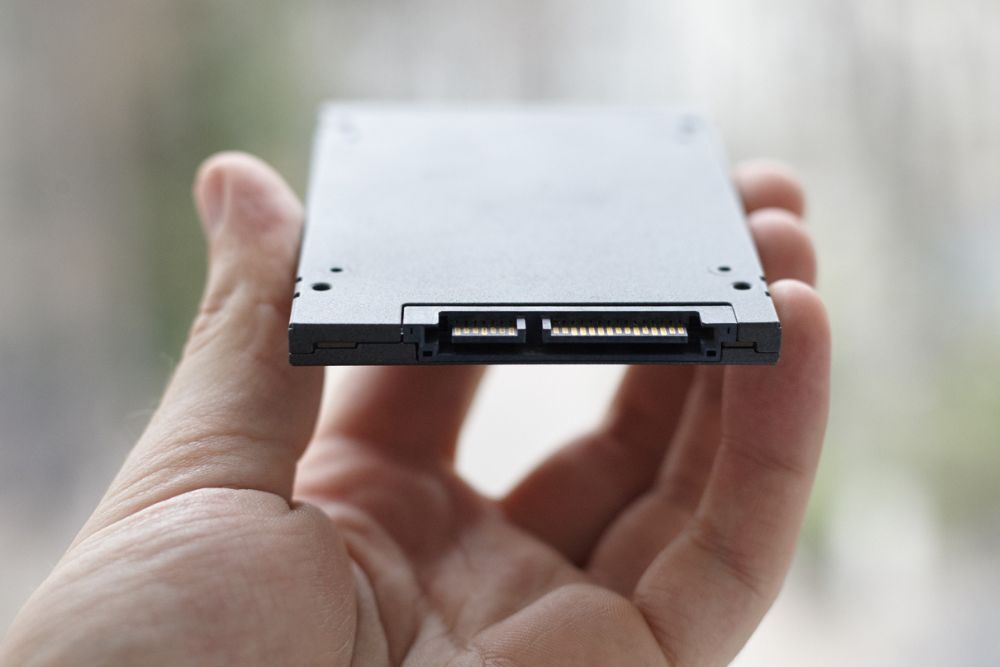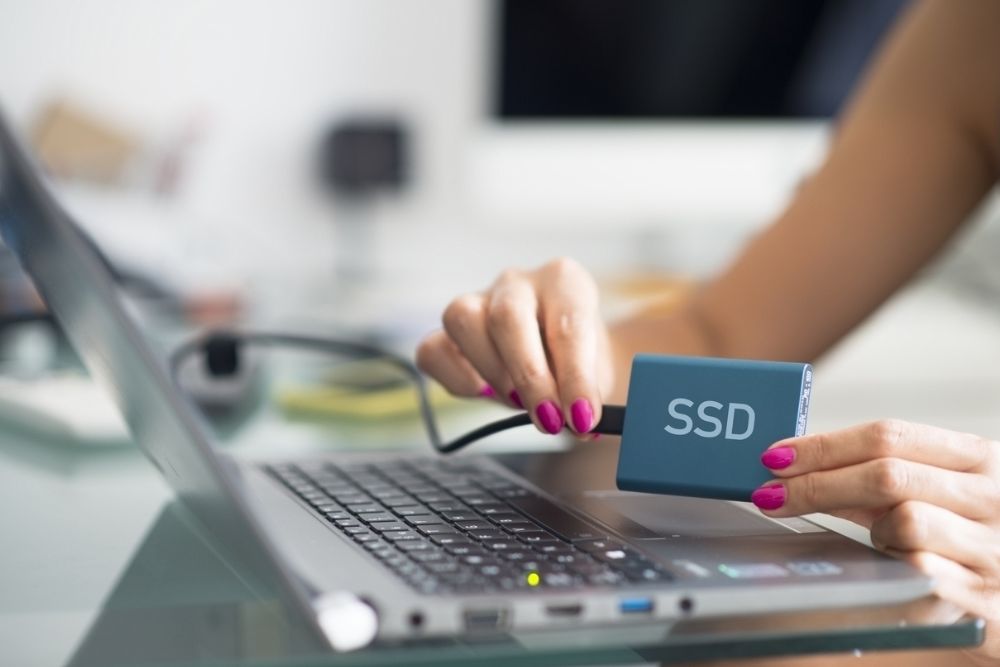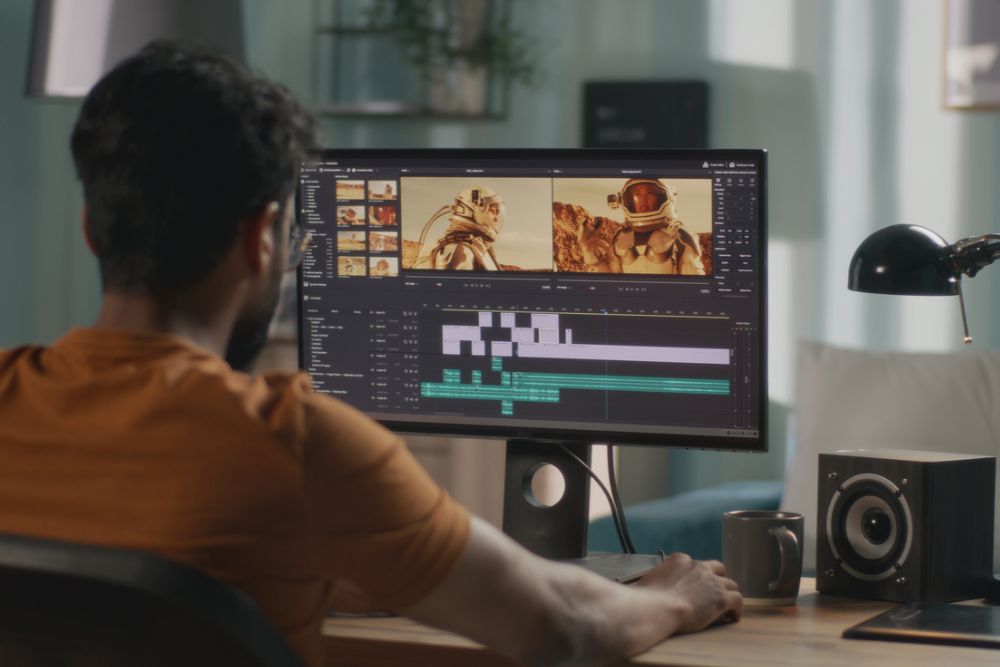Many small business owners and personal PC users who contact RB’s Computer Service with speed issues often need more SSD storage. Working on a computer with a too-small-for-your-needs SSD can be frustrating for personal PC users, and costly for small business owners in terms of productivity. Identifying SSD storage issues is the easy part for most people, but determining how much is not as transparent for non-techies. In this month’s blog, we’ll explore everything you need to know about how much SSD storage space you should have. Many of our blog readers are not techies. As a result, before we explore SSD storage, let’s first take a look at what an SSD is. If you need help navigating SSD storage options, don’t hesitate to contact RB’s Computer Service at 763-441-3884.
What is an SSD drive?
 A solid-state drive (SSD) is a type of computer storage device that stores data using integrated circuits instead of moving parts. SSDs are faster, smaller, and quieter than hard disk drives (HDDs). They are also more reliable and energy efficient because they don't have mechanical components that can wear down or break over time, although the memory cells that make up the SSD drive can become unreliable after extensive re-writes of data, and the drive may fail from this.
A solid-state drive (SSD) is a type of computer storage device that stores data using integrated circuits instead of moving parts. SSDs are faster, smaller, and quieter than hard disk drives (HDDs). They are also more reliable and energy efficient because they don't have mechanical components that can wear down or break over time, although the memory cells that make up the SSD drive can become unreliable after extensive re-writes of data, and the drive may fail from this.
Internal vs external SSD drives
SSDs can be internal or external. Internal SSDs are installed inside the computer and connected to the motherboard. External SSDs are plugged in like external HDDs, often to USB 3.0 ports. If You need more SSD storage, you can often swap out your current drive with more SSD storage in your laptop or tower computer. Or you can connect to more SSD storage using an external drive.
64GB of SSD Storage is NOT Enough
 Microsoft’s official minimal system requirement for Windows 11 is 64GB of SSD storage. It would not be wise to go with an SSD drive of this size, as there would be no room left to install any additional software in a drive that small. Many owners of new PCs report that things become sluggish after they install third-party applications, download files, or manage PC games when they have a smaller SSD drive. Just adding the Meta Facebook app to engage, edit, download, and upload social media video content can be too much for 64GB of SSD storage.
Microsoft’s official minimal system requirement for Windows 11 is 64GB of SSD storage. It would not be wise to go with an SSD drive of this size, as there would be no room left to install any additional software in a drive that small. Many owners of new PCs report that things become sluggish after they install third-party applications, download files, or manage PC games when they have a smaller SSD drive. Just adding the Meta Facebook app to engage, edit, download, and upload social media video content can be too much for 64GB of SSD storage.
128GB of SSD Storage is the Bare Minimum for Consumer Use
For most personal PC users, 64GB of SSD storage simply isn’t realistic for everyday use. A safer bet is 128GB of SSD storage. SSDs slow down and lose performance when they are full and near capacity. For a low to moderate PC gamer, social media participant, video downloader, and uploader, you should be able to utilize the full 128GB of space on your SDD drive without it slowing down.
256GB is Better for the Average PC User
 Based on anecdotal conversations with our personal PC customers at RB’s Computer Service, 256GB seems to be the sweet spot. With 256GB of SSD storage, you can install some large applications, like Microsoft Office, store more data, and still have some room to spare. Plus, 256GB also happens to be the minimum SSD size requirement for Microsoft’s Copilot+ PCs. According to PC World, “more and more PCs will likely settle on this as a new minimum as Copilot+ PCs become more mainstream.” With 256GB of SSD storage, you shouldn’t have to think about your storage limit as often. One caveat, to run Microsoft Windows applications like Word, Publisher, Excel, PowerPoint, and Photoshop, you typically need a minimum of 256GB and up to 512GB of SSD storage space to comfortably accommodate these applications, your operating system, and files. The storage requirements to run these apps add up like this: Microsoft Operating System, 40–50GB, Microsoft Office Suite (Word, Publisher, Excel, PowerPoint) 4GB, and Adobe Photoshop 20GB. Then add 100GB for file storage and temporary files. If you are using these apps every day, and saving data, charts, video, and graphically designed photos (using more than 100GB for file storage and temporary files), 256GB of SSD storage is probably not enough. For this type of usage, 512GB to 1TB of SSD storage is probably a better fit.
Based on anecdotal conversations with our personal PC customers at RB’s Computer Service, 256GB seems to be the sweet spot. With 256GB of SSD storage, you can install some large applications, like Microsoft Office, store more data, and still have some room to spare. Plus, 256GB also happens to be the minimum SSD size requirement for Microsoft’s Copilot+ PCs. According to PC World, “more and more PCs will likely settle on this as a new minimum as Copilot+ PCs become more mainstream.” With 256GB of SSD storage, you shouldn’t have to think about your storage limit as often. One caveat, to run Microsoft Windows applications like Word, Publisher, Excel, PowerPoint, and Photoshop, you typically need a minimum of 256GB and up to 512GB of SSD storage space to comfortably accommodate these applications, your operating system, and files. The storage requirements to run these apps add up like this: Microsoft Operating System, 40–50GB, Microsoft Office Suite (Word, Publisher, Excel, PowerPoint) 4GB, and Adobe Photoshop 20GB. Then add 100GB for file storage and temporary files. If you are using these apps every day, and saving data, charts, video, and graphically designed photos (using more than 100GB for file storage and temporary files), 256GB of SSD storage is probably not enough. For this type of usage, 512GB to 1TB of SSD storage is probably a better fit.
512GB to 1TB of SSD Storage Should be the Minimum for Business Use, Marketing Pros, and Avid Gamers
Also based on anecdotal conversations with local business owners, marketing pros, and avid gamer customers at RB’s Computer Service, 512GB of SSD storage seems to be a sweet spot for them. However, if you need more than 256GB of SSD storage, the trick is not to overspend on unused capacity. For basic web browsing, office work, and streaming media, 256GB is more than enough. But if you plan on storing lots of large video files or installing PC games, you’ll need more than 512GB of SSD storage. To help determine if you need as much as 1TB of SSD storage, let’s look at the capacity of 1TB of SSD storage.
How much is 1TB of SSD Capacity?
- Approximately 250,000 high-resolution photos.
- Around 250 HD movies or about 500 hours of HD video.
- Around 6.5 million document pages, such as Word or PDF files.
- Thousands of applications or games, though the exact number depends on the size of each.
- Essentially, 1TB is suitable for users with a need for significant storage, such as for media files, large datasets, or extensive software libraries.
If you are unsure if your personal PC or business PCs need more than 256GB of SSD storage, don’t hesitate to contact RB’s Computer Service. We can help you analyze your current data usage and needs and provide you with uncomplicated and seamless options.
Bottom Line
When your computer gets sluggish, it often means you need more storage. While the least expensive new PCs may have 64GB of SSD storage, it is not enough. On the one hand, 128GB of SSD storage is the bare minimum for consumer use, but 256GB is a better option. For business, 512GB to 1TB of SSD storage seems to be the sweet spot. There are a lot of factors that go into the ideal amount of SSD storage for businesses. The trick is not to overspend on unused capacity. RB’s Computer Service can help you analyze your current data usage and needs and provide you with uncomplicated and seamless options. Don’t hesitate to contact us at 763-441-3884 or email us at help@rbsmn.com. In addition to SSD drives, RB’s Computer Service sells previously owned commercial-grade PCs with SSD drives starting at $550, we offer computer network security plans and data backup programs, and we provide Managed IT Service Agreements to monitor and troubleshoot your computer network.
References
How much SSD space do you really need? Don’t skimp unless you have to.
https://www.pcworld.com/article/2489675/how-much-ssd-storage-space-do-you-really-need.html
The Growing Size of Media: Just How Much Information Can Be Stored on 1TB?
https://www.infosecurity-magazine.com/blogs/how-much-information-stored-1tb/
SSD (solid-state drive)
https://www.techtarget.com/searchstorage/definition/SSD-solid-state-drive
Photoshop system requirements
https://helpx.adobe.com/photoshop/system-requirements.html
Photoshop System Requirements: Ensuring Smooth Performance
https://smartcourses.io/blog/photoshop-system-requirements-ensuring-smooth-performance/
Photoshop System Requirements: A Hands-On Guide
https://blog.udemy.com/photoshop-system-requirements/
1TB SSDs Explained: What You Need To Know Before You Buy
